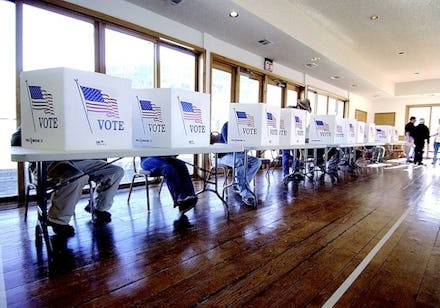The Simple Solution to Fix Voting Rights For Young People in America

Who could forget last year's Daily Show interview, when North Carolina Precinct Chairman Don Yelton shocked America with his jarring defense of North Carolina's voter identification law:
The Daily Show
Yelton had this shocking thing to say about voter ID laws in the state of North Carolina, "If it hurts a bunch of college kids that's too lazy to get up off their 'bohunkas' and go get a photo ID, so be it … If it hurts a bunch of lazy blacks … so be it."
In an era of voter repression, there seem to be few left who will defend voting rights for us "bohunka"-sitting students and "lazy blacks."
Enter the Presidential Commission on Election Administration (PCEA). The commission — a bi-partisan task force of seasoned elections administrators, corporate professionals, and one Walt Disney World executive — was formed after President Obama called for voting reforms in his 2013 State of the Union Address.
On Wednesday, the PCEA released a report highlighting new technologies and best practices for reforming the voting process on Election Day. The report is a refreshing development after recent legislation and court action threatened to roll back decades of progress on the voting rights front.
Back in 2012, voters across the country were forced to endure long lines and hurdle frustrating bureaucratic obstacles in order to vote on Election Day. These lines were largely due to superfluous legislation that, despite an attempt to eliminate "voter fraud," served more as a frustrating obstacle for youth and minority voters.
To make matters worse, the Supreme Court in 2013 struck down a key provision of the Voting Rights Act that protected citizens in districts with records of voter disenfranchisement. Since then, a number of states have moved forward with new restrictive legislation. Texas and North Carolina made headlines in 2013 for enforcing Voter ID laws. Kansas and Arizona have both passed laws requiring proof of citizenship for state and local elections, in effect establishing a two-tiered system that disenfranchises those without easy access to a birth certificate or social security card.
The PCEA's report came after six months of research and public hearings. Activists and voting rights advocates like Rock the Vote were pleased to see that the report, among other key recommendations, emphasizes Online Voter Registration (OVR). Online registration facilitates the registration process by making registration more accessible to young people and minorities. It is an approach that Rock the Vote and other organizations have been working to advance for the last decade.
Rock the Vote developed the first OVR system back in 1996, and there are many benefits. Online registration, as opposed to paper forms, cuts down on paper waste, reduces risk of error, and allows voters to register in a comfortable and familiar online context. Nineteen states have already adopted online registration technology, but that still leaves a majority with antiquated paper forms. In an age when even the IRS allows users to complete tax filings online, it's high time states move to catch up with modern technology.
Although not a catch-all solution to stop voting repression, OVR will simplify the registration process and minimize wait time on Election Day. OVR also has the added benefit of assisting civic mobilization organizations to register new voters. Community registration drives have been shown to increase voter turnout by as much as 30%, and the process itself is simple and secure. According to a white paper (Connected OVR: A Simple, Durable Approach to Online Voter Registration) published by Rock the Vote, "an OVR platform is like a virtual mail slot, through which Designated Partners can deliver the completed registration applications they have gathered from users."
So what next? As exciting as this development is, the PCEA report has no legislative authority. Both President Obama's stamp of approval and the credibility of the bi-partisan commission put significant weight behind the PCEA's recommendations, but without action at the state and local levels, it will go nowhere. It's up to us to make sure our elections officials adopt these new recommendations and take action to bring Election Day into the new century.